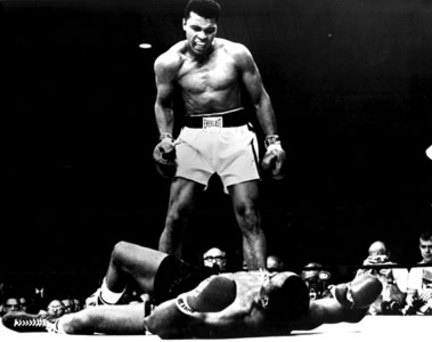 I don't know. I don't think so. It just sounds like an attention grabbing way to introduce people to a celebration of Ali. Let's just celebrate Ali for the sake of celebrating Ali. We don't need to make some crazy correlation to do so. Just watch the tapes of the Rumble, the Thrilla, or any other Ali fight. The guy was amazing.
I don't know. I don't think so. It just sounds like an attention grabbing way to introduce people to a celebration of Ali. Let's just celebrate Ali for the sake of celebrating Ali. We don't need to make some crazy correlation to do so. Just watch the tapes of the Rumble, the Thrilla, or any other Ali fight. The guy was amazing.
My dad had the opportunity to see Ali work out in Boston years ago. His father, my grandfather, was a Boston firefighter, knew the right people and there they were in a small gym in Brookline watching the greatest of all time work out. When he was on the bag, you couldn't see the bag. When he jumped rope, you couldn't see the rope. When he shadowboxed you could barely follow his hands. Let's celebrate stories like that. Let's not - let's not - watch Charlie Gibson do spoken word Ali.
I, naturally, came across this article looking for more news, better news, newer news in regards to the hot stove maneuverings of the Red Sox. The videos are great, particularly the first, but I have to agree with Klosterman, watching people recite Ali kind of defeats the point. I haven't seen the whole thing - and I will watch it - but it does rub me the wrong way. Don't recite his lines. Don't imitate him. Tell me a story. Tell me what it was like to watch Ali enter the ring in Zaire with an entire nation behind him. But don't give me Charlie Gibson spoken word. Please.
Chuck D? Chuck K? Your thoughts, please.
"Public Enemy front man Chuck D, the host of 'Ali Rap,' [airing Saturday at 9 P.M. ET on ESPN] is a man who has always understood the relationship between rap and sports. Chuck claimed to have adopted his rapping style from Marv Albert (listen to the opening 15 seconds of 'Rebel Without a Pause' if you need proof). Half of the documentary features an undefined collection of modern-day celebrities (James Earl Jones, Diane Sawyer, Al Sharpton, Adam Corolla, Ludacris, Bill Maher, etc.) reciting famous Ali quotations as spoken-word poetry. This almost never works; almost all of the stand-in participants sound ridiculous, particularly the ones who are Caucasian and named Charlie Gibson. However, the actual archive footage of Ali talking is amazingly watchable and mildly shocking, even if you've seen most of it before. Ali is arguably the greatest boxer of the 20th century, but he also might be one of the most charismatic conversationalists ever (which - all things considered - is a far more rarified achievement).
"While it's difficult to prove Ali invented rap music, it's almost indisputable that he spawned what is now referred to as 'the modern athlete,' a term that's generally used as coded, pejorative language. When someone complains about 'the modern athlete,' he or she is usually just saying, 'This particular black athlete behaves like a rap star, even though I've never actually listened to rap music in my entire life.' These perceived traits include overt self-promotion, indifference toward authority, and confidence that hemorrhages into arrogance. As such, the relationship among Ali, sport, and rap is latently omnipresent, and examples of that three-pronged relationship are everywhere: 50 Cent buys Mike Tyson's house, Master P tries out for the Toronto Raptors, Ron Artest releases 'My World,' dead-end kids in Houston drink cough syrup and wear McGrady jerseys, and Fort Minor's 'Remember the Name' is used as bumper music for 90 percent of televised college football games that don't involve Notre Dame. You can see these connections without even looking for them. But the deeper (and more meaningful) correlation between hip-hop culture and sports is more opaque; it has less to do with what they tangibly offer and more to do with how they're similarly covered by the media."
[Chuck Klosterman at Page 2]























No comments:
Post a Comment